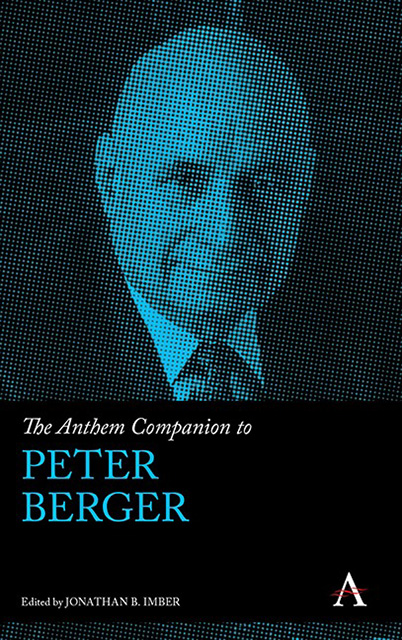Book contents
- Frontmatter
- Contents
- Introduction
- Chapter 1 Plurality, Choice, and The Dynamics of Doubt
- Chapter 2 Peter L. Berger and The Challenge of Modern Pluralism
- Chapter 3 Making Peace With Pluralism In America
- Chapter 4 Religion and Secularity in A Desecularizing Russia
- Chapter 5 The Moral Limits of Religious Pluralism
- Chapter 6 Peter L. Berger and Arnold Gehlen: Secularization, Institutions and Social Order
- Chapter 7 Peter L. Berger’s Three Religions
- Chapter 8 Objectivation: The Material Heritage of Peter L. Berger
- Chapter 9 Peter L. Berger’s The Social Construction of Reality
- Chapter 10 The Untaken Road to Phenomenological Sociology
- Chapter 11 Cheering for Capitalism
- Chapter 12 Peter L. Berger and Economic Sociology
- Chapter 13 Peter L. Berger Changed The Direction of My Work … and My Life
- Chapter 14 Peter L. Berger On Religion as Choice Rather Than Fate
- List of Contributors
- Index
Chapter 2 - Peter L. Berger and The Challenge of Modern Pluralism
Published online by Cambridge University Press: 17 October 2023
- Frontmatter
- Contents
- Introduction
- Chapter 1 Plurality, Choice, and The Dynamics of Doubt
- Chapter 2 Peter L. Berger and The Challenge of Modern Pluralism
- Chapter 3 Making Peace With Pluralism In America
- Chapter 4 Religion and Secularity in A Desecularizing Russia
- Chapter 5 The Moral Limits of Religious Pluralism
- Chapter 6 Peter L. Berger and Arnold Gehlen: Secularization, Institutions and Social Order
- Chapter 7 Peter L. Berger’s Three Religions
- Chapter 8 Objectivation: The Material Heritage of Peter L. Berger
- Chapter 9 Peter L. Berger’s The Social Construction of Reality
- Chapter 10 The Untaken Road to Phenomenological Sociology
- Chapter 11 Cheering for Capitalism
- Chapter 12 Peter L. Berger and Economic Sociology
- Chapter 13 Peter L. Berger Changed The Direction of My Work … and My Life
- Chapter 14 Peter L. Berger On Religion as Choice Rather Than Fate
- List of Contributors
- Index
Summary
Although better known for his foundational writings in the sociology of religion, modernity, and capitalism, Peter L. Berger was for his entire life preoccupied with the challenge of modern pluralism. He understood the latter as involving, not just the growing diversity of religious traditions in society, but the deeper question of how human beings can co-exist in peace in an age when a shared experience of both everyday realities and ultimate meanings gives way to social worlds in which individuals with deeply different world views live side by side in society. In this chapter, I provide an overview of Berger’s evolving understanding of modern pluralism. In the final and larger part of this chapter, I review and assess the ideas he developed in the last years of his life, during which time I had the pleasure of being his colleague.
Pluralism as an Emergent Effect of Modernity
In his early works, including The Sacred Canopy: Elements of a Sociological Theory of Religion (1967), and his no less monumental The Social Construction of Reality (1966; co-authored with his life-long friend, Thomas Luckmann), Berger linked the problem of modern plurality to what he described as the dialectics of social life. According to the latter model, social worlds are products of an ongoing interaction between the individual, social structures, and the institutions of society as a whole. The interaction begins when an individual “externalizes” meanings through cognitive and physical activity, thereby contributing to the creation of broader social structures which, in a third phase of the dialectic, are then “reappropriated” or internalized as “structures of consciousness” (Berger 1967, 14). Seen from this ever-evolving perspective, “subjective reality is […] always dependent upon specific plausibility structures […] without which the definition of reality in question cannot be maintained in consciousness” (Berger and Luckmann 1966, 174–75).
Drawing on such early twentieth-century scholars as Emile Durkheim and Rudolf Otto, Berger argued that religion often has a privileged place in the construction of this social reality. “Religion has been the historically most widespread and effective instrumentality of legitimation” for a particular world view or social reality, providing an overarching “social canopy” for meaningful human experience.
- Type
- Chapter
- Information
- The Anthem Companion to Peter Berger , pp. 9 - 20Publisher: Anthem PressPrint publication year: 2023

